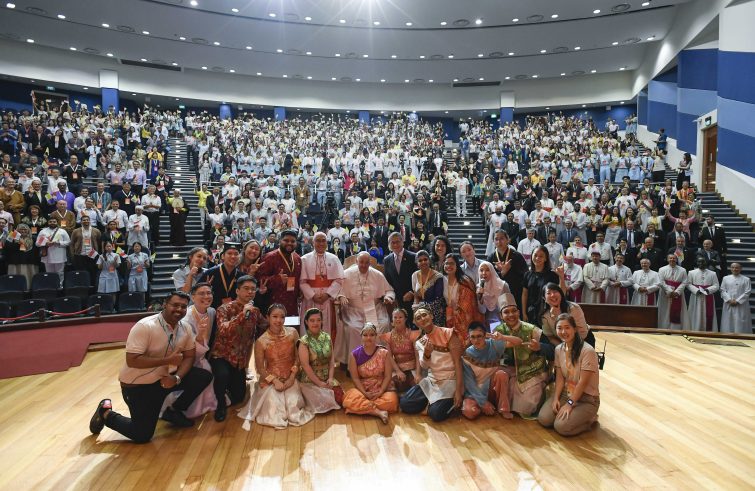
Two continents, four countries, 32,000 kilometres travelled. Pope Francis has just returned from his 45th Apostolic Journey, the longest of his pontificate. The presence of a group of Chinese faithful at Holy Mass in the stadium in Singapore, the last public gathering before his return to Rome, is by no means marginal, but one of the most memorable images. In a way, it was symbolic of a dream that the Pope “who came from the end of the world” hopes to fulfil in his next destination, as he reiterated in a conversation with journalists on board the plane that brought him back to Rome. At the same time, thanks to the warm welcome and affection he received, not only from the Catholic population, which he returned with smiles, embraces and gestures of closeness, especially in his meetings with children, the disabled and young people, this long trip to Asia and Oceania has undoubtedly rejuvenated him. The huge crowd of 600,000 people – half the population of the country – who thronged the esplanade of Taci Tolu to attend the Holy Mass in Timor-Leste is another unforgettable image, an eloquent expression of the warmth of the inhabitants of this part of Asia, where the majority of the continent’s Catholics live and where Catholicism is the soul of an entire nation. A young people like those of Papua New Guinea, whom Francis praised on his first visit to Oceania for their friendliness in harmony with the magnificent natural environment. Dialogue was the key word of his visit to Indonesia, while the Pope warned of the dangers of soulless progress that leaves the marginalised and socially excluded behind, in the face of Singapore’s opulence.
“United in diversity”. The Pope’s speech in Indonesia is a tribute to the “secret” of the Indonesian people, while at the same time showing the world the direction to take in “countering extremism and intolerance”, “isolating rigidity, fundamentalism and extremis”” and averting conflicts and wars that are “also caused by the manipulation of religion”. In the archipelago of 17,508 islands, where the majority of the world’s Muslim population lives in a harmony of diversity, the Pope quoted the poet Wanda Szymborska to stress that fraternity means “recognising each other ‘as different as two drops of water'”.
The two public events in Indonesia centred on a visit to the Istiqlal Mosque, the largest in Asia, which hosted the interfaith meeting, and the signing of a joint declaration, five years after the Abu Dhabi document on Human Fraternity,
Earlier in the day, Pope Francis and the Grand Imam, Nasaruddin Umar, walked together through the ‘Tunnel of Friendship’, an underground passageway connecting the Cathedral of Our Lady of the Assumption and the Istiqlal Mosque, in an exemplary display of dialogue.
“Promote initiatives that develop natural and human resources in a sustainable and equitable manner that improves the well-being of all, excluding nobody”, Bergoglio said in his first visit to Oceania. From Papua New Guinea, an archipelago of hundreds of islands with more than eight hundred languages spoken by as many ethnic groups, he described the country “so far from Rome and yet so close to the heart of the Catholic Church”, as a paradise worthy of protection, with its vast natural resources. He appealed to “the sense of responsibility of everyone”, starting with the multinational companies involved in “the exploitation of resources.”
“Peace, peace for the Nations and for creation”,
the Pope’s global appeal sent out during the Angelus prayer.
“Love is stronger than all this and its beauty can heal the world, because it has its roots in God”, Francis reiterated in Vanimo, a town of 11,000 surrounded by rainforest and one of the most biodiverse places on earth. For the Pope, the children, with their radiating smiles and bursting joy, are the most beautiful image that anyone leaving this place can take with them and cherish in their hearts. Indeed, the meeting with street and disabled children was one of the most moving moments of the second leg of the Pope’s journey to Asia and Oceania. “None of us is like anyone else, because we are all unique in God’s eyes!”, Francis assured. From a periphery the world has almost forgotten he urged to be close to the “peripheries of this country”, as did the missionaries who “did not give up: starting again many times whenever they failed.”
Peace, purification of memory, commitment for development. Those are the Pope’s wishes for Timor-Leste. “May the Lord grant that in other conflicts in various parts of the world the desire for peace will prevail, because unity is always superior to conflict; the peace of unity is always superior to conflict. This also requires a certain purification of memory, in order to heal wounds, to overcome hatred with reconciliation and confrontation with cooperation!” he said expressing his wishes for this Asian country, that was able to achieve “full reconciliation” with Indonesia, and for world. In Timor-Leste, where 65% of the population is under 30 years of age, the Pope asked to invest in education to ‘build a free, democratic and united country, where no one feels excluded and everyone can live in dignity and peace.”
In Singapore, the Pope returned to focus on the international scenario, “threatened by conflicts and bloody wars” and paid tribute to one of the four Asian tigers for promoting mutilateralism. He expressed the hope that “special attention will be paid to the poor and the elderly” as well as to “protecting the dignity of migrant workers”, the first request to the authorities of the island-state, whom he guarded against the unintended consequence of “justifying the exclusion of those on the margins from benefiting from progress.”










